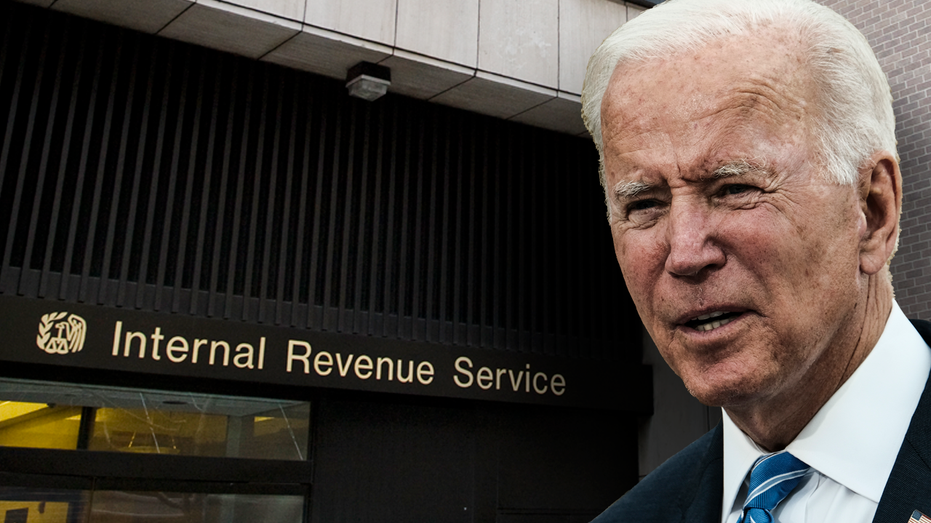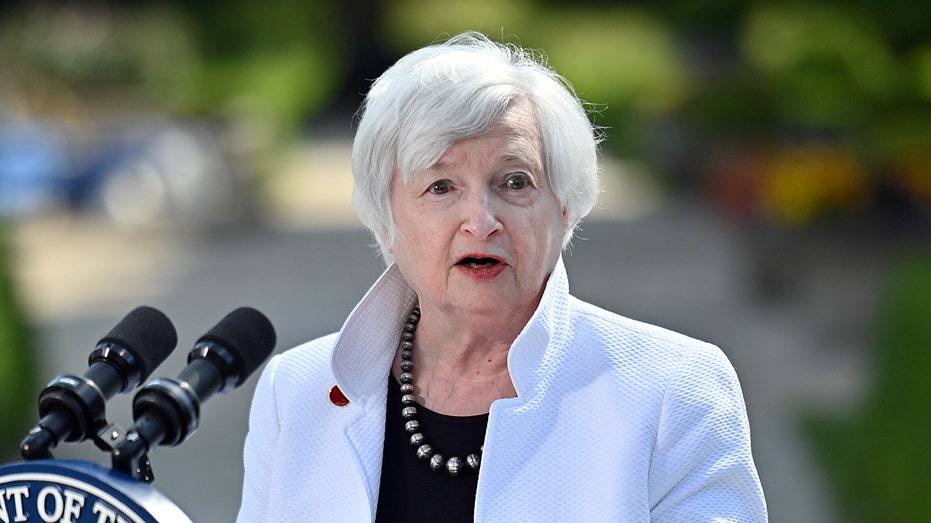Republicans, Democrats and Treasury wrangle over effects of Biden's new IRS bank account reporting proposal
Democrats say they would exempt wage income and people with less than $10,000 of overall yearly bank activity
America should fear Biden's IRS proposal: Rep. Ferguson
House Ways and Means Committee member discusses IRS surveillance on 'Fox Business Tonight'
Republican senators sniped back and forth with the White House and Treasury Department Tuesday as debate over Democrats' yet-to-be-written IRS bank account reporting proposal flared yet again on Capitol Hill.
The reporting requirement is one potential provision in Democrats' unwritten reconciliation bill. It would require banks to report the inflows and outflows of certain accounts to the IRS in an effort to find unreported taxable income and help fund the bill's other social and environmental programs.
Democrats Tuesday touted a new proposed threshold for their plan that they say would exempt wage income and people with less than $10,000 of overall yearly bank activity instead of $600, underscoring their commitment to target rich people for tax enforcement. Meanwhile, Republicans argued that the new plan would still sweep up many regular Americans despite what Democrats say is just an effort to catch rich tax cheats.
BIDEN ADMINISTRATION SCALES BACK IRS BANK-MONITORING PLAN AMID GROWING PUSHBACK
"The average American will be picked up by this plan and I think virtually every small business," Sen. Mike Crapo, R-Idaho, said at a press conference.
"If the only income that a household has is wages, I'm pretty sure that they're going to spend some of that income and hit the $10,000 threshold. And then they're pulled into the game," Crapo added, implying that if a wage worker spends more than $10,000, they would be included
Democrats' initial proposal would have required banks to report inflow and outflow information of every bank account with more than $600 in total yearly activity to the IRS, no matter the source of income or size of any individual transaction.

"The National Debt Clock" in New York City on 44th Street above an Internal Revenue Service office. (Photo by James Leynse/Corbis via Getty Images) U.S. President Joe Biden speaks during a visit to the International Union of Operating Engineers Local (. (Photo by James Leynse/Corbis via Getty Images) Matthew Hatcher/Bloomberg via Getty Images / Getty Images)
But the Treasury, which backed the initial reporting requirement, pushed back on Crapo's characterization of the adjusted proposal. It said that for a person making only wages, their expenditures up their total yearly wages are exempt from counting toward the $10,000 threshold too – not just their wage income.
A person who makes wages, salary or receives government benefits, according to the Treasury, would only be subject to the reporting requirement if they make $10,000 in income from another source, or if they spend $10,000 more than their wage income.
Crapo's comment, notably, was made when the main source of information on the proposal early Tuesday was a Washington Post story published late Monday about Democrats' adjusted proposal.
BIDEN SEEKS TO RESTART STALLED AGENDA WITH CRUCIAL MEETINGS WITH DEMOCRATIC LAWMAKERS
"The revised version of the bank reporting proposal will also weaken its scope by exempting all wage income from counting toward the $10,000 threshold," the story said of the exemption for wage earners, without detailing whether their spending would count.
Other bits of information – including a statement by Treasury Secretary Janet Yellen and Treasury Department fact sheet– lacked details about how the proposal would work, and therefore it wasn't clear how it would apply to wage earners who spend more than $10,000.

U.S. Treasury Secretary Janet Yellen speaks during a news conference, after attending the G7 finance ministers meeting, at Winfield House in London, Britain June 5, 2021. Justin Tallis/Pool via REUTERS/File Photo (Justin Tallis/Pool via REUTERS / Reuters Photos)
"Under the current proposal, financial accounts with money flowing in and out that totals less than $10,000 annually are not subject to any additional reporting," the Treasury fact sheet said. "Further, when computing this threshold, the new, tailored proposal carves out wage and salary earners and federal program beneficiaries, such that only those accruing other forms of income in opaque ways are a part of the reporting regime."
"Today’s new proposal reflects the Administration’s strong belief that we should zero in on those at the top of the income scale who don’t pay the taxes they owe, while protecting American workers by setting the bank account threshold at $10,000 and providing an exemption for wage earners like teachers and firefighters," Yellen said in her statement.
Shortly after Crapo and several other Republicans hammered the adjusted proposal Tuesday, White House Press Secretary Jen Psaki also weighed in on it.
"People who get W-2s… that's not what we're talking about here," Psaki said. "We're talking about high net worth individuals who are not paying the taxes they owe."
Psaki added: "The $10,000 is, the, anything under that would not be applicable, nor would people who receive W-2s."
Sen. Elizabeth Warren, D-Mass., also said on a Tuesday press call that the threshold will be based on "the total number of dollars that have come into an account and the total numbers that have gone out, not including wage W-2 income."

Sen. Elizabeth Warren, D-Mass., speaks during a news conference on Capitol Hill in Washington, Monday, March 1, 2021, to unveil a proposed Ultra-Millionaire Tax Act. (AP Photo/Susan Walsh) (AP / AP Newsroom)
There is still technically no legislative text for the adjusted reporting proposal – information is limited to a series of statements and fact sheets released by Democrats and the Treasury Department. So it is impossible to know all the details of it.
But according to the information that is available, it would still almost certainly sweep up many investors and other people who are far from millionaires. And it would send bank inflow and outflow information for virtually every small business to the IRS.
GET FOX BUSINESS ON THE GO BY CLICKING HERE
"The exclusion of payroll and federal program beneficiaries does not address millions of other taxpayers who will be impacted by this proposal," Crapo said on the Senate floor later Tuesday. "Not every nonwage worker is a millionaire. How about self-employed hairstylists, convenience store owners, and farmers, just to name a few?"
Crapo added: "If enacted, this new proposal would still raise some of the same privacy concerns, increase tax preparation costs for individuals and small businesses, and create operational challenges, particularly for community banks."
"It's a stupid idea," Sen. Chuck Grassley, R-Iowa, said Tuesday. He added that Iowans "don't want the peering eyes of the IRS snooping on them."
Grassley went on to cite a recent leak of IRS information to ProPublica as evidence that Americans' banking data would not be safe in the hands of the IRS.
FOX Business' Kelly Phares contributed to this report.





















